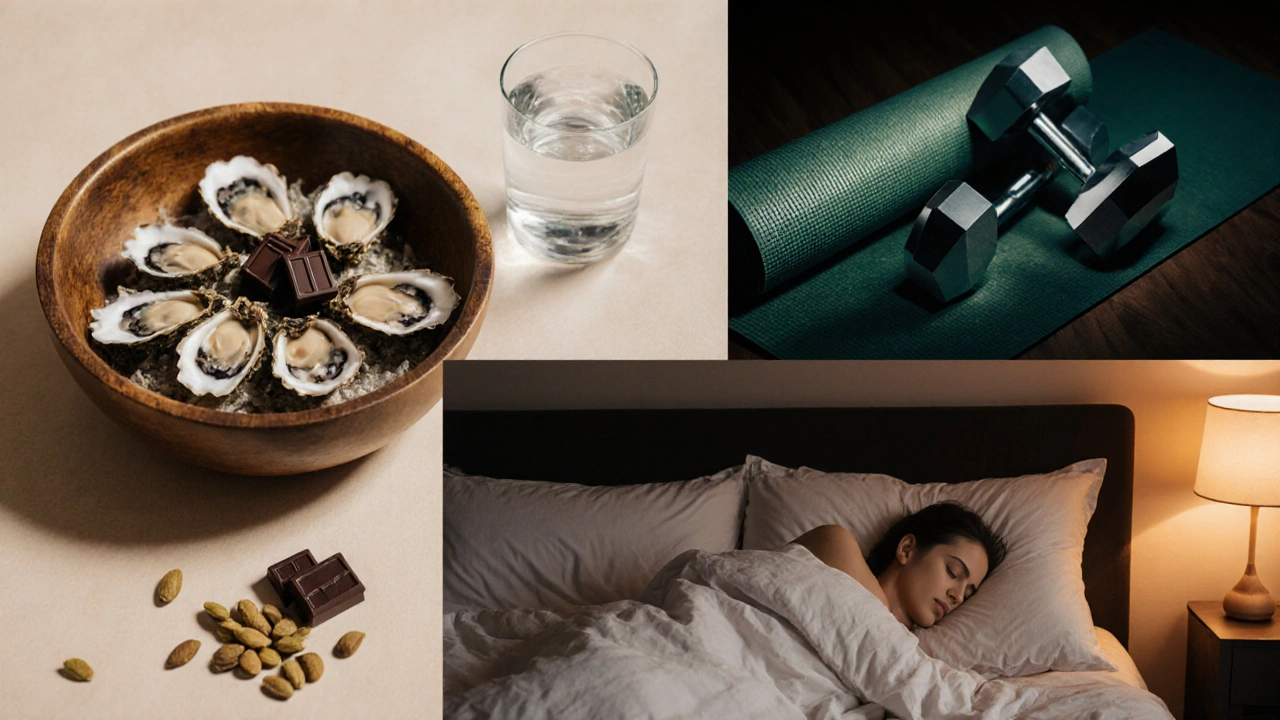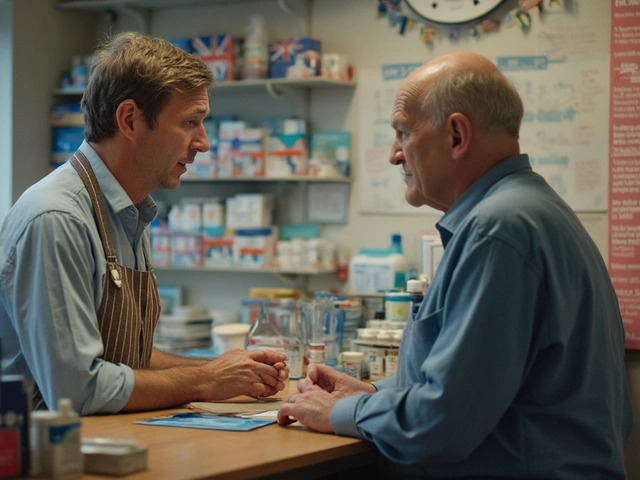Libido Boosting Habit Tracker
🍽️ Balanced Diet
Eat libido-boosting foods like oysters, leafy greens, dark chocolate, and fatty fish.
🏃♂️ Regular Exercise
30 minutes of cardio or strength training helps boost testosterone and circulation.
😴 Quality Sleep
7-9 hours of sleep per night supports hormone balance and recovery.
🧘 Stress Management
Practice mindful breathing or digital detox to reduce cortisol levels.
📈 Your Progress Summary
Key Takeaways
- Balanced diet, regular movement, and good sleep are the backbone of a healthy sex drive.
- Stress and alcohol are silent libido killers; managing them can spark noticeable change.
- Open communication with a partner often fixes the emotional dip that lowers desire.
- Simple habit trackers help you see progress and stay motivated.
- Small, consistent tweaks beat drastic, unsustainable overhauls.
When low libido is a reduced sexual desire that many adults experience, lifestyle tweaks can make a big difference. Below we break down the most effective changes, why they work, and how to fit them into a busy life.
Understanding What Low Libido Means
Sexual health is the state of physical, emotional, and relational well‑being concerning sexuality isn’t just about performance; it’s about feeling comfortable, interested, and satisfied. Low libido can stem from hormonal shifts, poor nutrition, chronic stress, inadequate sleep, or relationship friction. Pinpointing the biggest contributors in your life lets you target the right fixes.
Eat This, Skip That: Diet That Fuels Desire
What you put on your plate directly influences hormone production and blood flow. Here are the top foods and those to limit.
| Boosters | Why they help | Neutral/Detractors | What to watch |
|---|---|---|---|
| Oysters & shellfish | High in zinc, crucial for testosterone | Processed meats | High sodium, can impair circulation |
| Leafy greens (spinach, kale) | Rich in magnesium, improves blood flow | Refined carbs | Spikes insulin, may lower libido |
| Dark chocolate (70%+) | Contains phenylethylamine, a mood‑enhancer | Excessive alcohol | Depresses nervous system, reduces desire |
| Fatty fish (salmon, mackerel) | Omega‑3s support hormone balance | Sugary drinks | Can lead to weight gain, affecting self‑esteem |
Tip: Aim for at least three of the booster categories in a day and keep the detractors to occasional treats.
Move Your Body, Ignite Your Desire
Exercise is any physical activity that raises heart rate and improves circulation does more than sculpt muscles. Moderate cardio (30minutes, 3‑5times a week) spikes endorphins, reduces cortisol, and promotes nitric oxide release - all key for a healthy sex drive. Strength training, especially lower‑body work, boosts testosterone naturally.
- Start with a brisk walk or bike ride for 10minutes a day.
- Add two 20‑minute bodyweight circuits (squats, lunges, push‑ups).
- Include a weekly yoga or pilates session to improve flexibility and pelvic floor strength.
Consistency beats intensity; a short daily habit trumps a once‑a‑month marathon.
Taming Stress and Calming the Mind
Stress is the body’s response to perceived threats, releasing cortisol and adrenaline hijacks the brain’s pleasure centers. Chronic stress lowers testosterone and dampens the desire signals.
- Mindful breathing: 4‑7‑8 technique (inhale 4sec, hold 7, exhale 8) before bed.
- Digital detox: turn off notifications an hour before sleep.
- Weekly hobby: dedicate 1‑2hours to something you love, whether it’s gardening, painting, or playing a musical instrument.
When stress drops, you’ll notice mood lift and a steadier libido.
Sleep: The Unsung Hero of Desire
Sleep is the restorative period where the body repairs tissues and balances hormones matters. Aim for 7‑9hours nightly. Poor sleep disrupts luteinizing hormone (LH) and reduces testosterone by up to 20%.
Sleep hacks:
- Keep the bedroom cool (≈18°C) and dark.
- Use a consistent wind‑down routine - reading, stretching, or a warm shower.
- Avoid caffeine after 2pm.
Alcohol, Smoking, and Other Lifestyle Vices
Both alcohol and excessive drinking can depress the central nervous system and blunt sexual response. Limit to no more than two drinks on social occasions; a binge can drop testosterone for up to 24hours.
Smoking narrows blood vessels, decreasing genital blood flow. Quitting improves circulation within weeks and often restores desire.

Relationship Talk: Communication as a Libido Booster
Emotional intimacy fuels physical intimacy. A simple weekly check‑in, where each partner shares likes, dislikes, and fantasies without judgment, can reignite spark.
- Use “I” statements: “I feel most connected when we …”
- Set aside a “no‑tech” date night once a month.
- Consider a couples’ workshop or therapist if recurring issues arise.
Tracking Progress and Staying Motivated
Small data points keep you honest. Create a habit tracker with columns for diet, exercise, sleep, stress‑relief, and intimacy rating (1‑10). Review weekly; adjust one habit at a time rather than overhauling everything.
When Lifestyle Tweaks Aren’t Enough
If after 8‑12weeks you still feel stuck, a medical check‑up can rule out thyroid problems, depression, or medication side‑effects. Often, a simple lab test reveals a treatable hormone imbalance.
Frequently Asked Questions
Can certain vitamins actually boost libido?
Yes. Vitamin D, zinc, and magnesium are linked to hormone production and blood flow. A daily multivitamin that includes these, or targeted supplements, can help if your diet lacks them.
Is it normal for libido to fluctuate with age?
Absolutely. Hormone levels naturally shift, but lifestyle factors often play a bigger role than age itself. Staying active, eating well, and managing stress keep desire steady.
How much alcohol is too much for sexual health?
Research shows that more than two standard drinks a day can lower testosterone and impair erection quality. Cutting back to occasional moderate use usually restores function within a few weeks.
Do I need a special diet if I’m vegetarian?
Focus on plant‑based zinc sources like pumpkin seeds, legumes, and whole grains. Pair them with vitaminC‑rich foods (citrus, bell peppers) to boost absorption.
Can mindfulness alone improve low libido?
Mindfulness reduces cortisol, which can free up hormone pathways for desire. While it’s powerful, pairing it with proper sleep, nutrition, and movement yields the strongest results.
By tweaking what you eat, move, sleep, and talk about, you can turn a sluggish desire into a vibrant part of daily life. Start with one change, track how you feel, and build from there. Your body-and your partner-will thank you.
low libido isn’t a permanent sentence; it’s a signal that something in your lifestyle needs attention. Use the steps above as a roadmap, and you’ll likely see both desire and overall well‑being rise.







19 Comments
Kickstart your mornings by loading up on zinc‑rich foods like oysters or pumpkin seeds, then hit the gym for a quick cardio burst-your hormones will thank you.
Swap out that sugary cereal for a protein‑packed smoothie with spinach and dark chocolate, and you’ll notice a steadier energy flow throughout the day.
Don’t forget to log your sleep hours; hitting seven to nine solid nights fuels testosterone production.
Stay consistent, push past the fatigue, and watch your desire level climb faster than you expect.
Drop the excuses and own the facts low libido is often a symptom of lifestyle decay it’s not a moral failing and the solution starts with cutting processed junk and moving your body daily.
When the candle of desire flickers, it is rarely the work of a capricious god but the quiet erosion of habits we accept as normal.
First, consider the diet: a steady intake of refined carbs and alcohol acts like soot on the wick, choking the flame of testosterone.
Yet the remedy is simple-replace those empty calories with omega‑rich salmon, leafy greens, and a modest square of dark chocolate, each a spark that fans the inner fire.
Second, the body craves movement; a stagnant physique mirrors a stagnant libido, and even a 30‑minute walk can awaken circulation to the most intimate regions.
Strength training, especially squats and deadlifts, floods the bloodstream with growth‑factor hormones, reinforcing sexual vigor.
Third, sleep is the silent architect of desire; without deep REM cycles, the hypothalamus cannot regulate luteinizing hormone, leaving testosterone adrift.
Adopt a night‑time ritual-cool room, dim lights, a brief meditation-to secure those restorative hours.
Stress, that relentless thief, floods the system with cortisol, which antagonizes testosterone production; mindfulness breathing, a digital detox, or a hobby can dismantle this tyranny.
Even the smallest habit, like a 4‑7‑8 breath before bed, can tilt the hormonal balance toward pleasure.
Moreover, the relational dimension cannot be ignored; open, non‑judgmental dialogue with a partner builds emotional safety, which in turn lubricates physical intimacy.
Set aside a weekly “check‑in” where desires and boundaries are aired without blame.
Remember, the journey is cumulative-do not expect a surge after a single night of salad and yoga; the body rewards consistency.
Track your progress in a simple table, noting diet, exercise, sleep, stress, and an intimacy rating; visual feedback fuels motivation.
If after eight weeks the numbers remain stagnant, a medical evaluation may reveal thyroid or medication influences.
In sum, the alchemy of desire blends nutrition, motion, rest, calm, and communication into a potent elixir that can reignite the spark.
I appreciate the thorough breakdown and would add that personalizing the habit tracker to include mood notes can further illuminate hidden patterns.
For instance, noting stress spikes alongside caffeine intake often reveals correlation that simple metrics miss.
Maintaining a formal tone in your entries ensures clarity when reviewing progress over weeks.
Overall, your comprehensive approach is commendable and can serve as a reliable framework for many seeking improvement.
Observing the interplay between nutrition and hormonal flux is akin to watching a slow‑burning fuse that eventually ignites a vibrant flame of desire, and it becomes evident that the small adjustments we make-such as swapping a processed snack for a handful of nuts or inserting a brief morning stretch-cumulatively build momentum that the body cannot ignore.
When one consistently embraces a balanced intake of zinc, magnesium, and healthy fats, the endocrine system receives the necessary substrates to synthesize testosterone and estrogen in harmonious ratios.
Coupled with regular cardio, even a modest 20‑minute jog, the circulatory network expands its capacity, delivering oxygen and nutrients more efficiently to the genitals, thereby enhancing sensitivity.
Sleep, often undervalued, functions as the nightly reset button, allowing the pituitary gland to secrete luteinizing hormone without interruption, a process that directly fuels libido.
Stress, the silent saboteur, releases cortisol which competes with the same receptors responsible for sexual arousal; incorporating mindful breathing or a short meditation sequence can dramatically lower this antagonist.
By documenting each of these pillars in a visible tracker, you create a feedback loop that reinforces adherence and highlights which habit requires further attention, ultimately guiding you toward a more satisfying sexual wellbeing.
While the guide lauds balanced meals and cardio, one could argue that occasional indulgence-like a weekend binge or late‑night wine-offers a psychological release that can paradoxically boost desire, reminding us that strict regimentation may sometimes extinguish the very spark it aims to kindle.
Ever notice how the wellness industry pushes these habit trackers right after a wave of new pharmaceutical libido pills? It's suspicious, as if they're trying to shift the blame for low desire onto personal failure while big pharma profits from the ensuing anxiety.
lol u r onto sumthing 🤔, but maybe the “trackers” are just a front to keep us buying more gadgets 😅. still, i think a little self‑track can help… if u dont get lost in the data 🙈
Implementing a KPI-driven habit matrix accelerates libido optimization through data‑centric feedback loops.
Wow, what an amazing, comprehensive, and absolutely transformative guide!! It really covers diet, exercise, sleep, stress management, and even communication-everything you need to boost desire!!!
Listen up-stop making excuses, grab those dumbbells, ditch the late‑night beers, and lock in a solid sleep schedule right now; the results will hit you hard and fast!
In the grand tapestry of human experience, desire is a thread woven from both corporeal and ethereal yarns, and when we neglect the material fibers-like nutrient density, movement, and restorative sleep-the pattern unravels, leaving us with a muted canvas of longing 🌌.
This process is not mere habit; it is an act of self‑authorship, a deliberate choreography between body and mind, where each deliberate breath and bite becomes a brushstroke on the portrait of intimacy.
Remember, the silence of a partner’s voice often echoes the emptiness of unaddressed stress, so open dialogues act as the solvent that dissolves tension, freeing the pigment of passion to flow.
Thus, by tracking progress-not as a punitive ledger but as a reflective mirror-we celebrate incremental victories, and each logged entry becomes a stanza in the poem of our renewed vitality 😊.
Honestly, most of these tips read like a recycled self‑help brochure; if you’re not willing to put in real effort, no tracker will save you.
Consistency is the real secret.
The modern narrative that frames low libido as a mere inconvenience is a betrayal of our ancestral vigor, for centuries our forebears thrived on disciplined routines, communal feasts rich in organ meats, and nightly rites that honored the stars, all of which forged a robust sexual vitality that our sedentary, processed‑food‑laden lifestyles have cruelly eroded.
To reclaim that primal fire, we must first purge the toxin‑laden banquet of fast food, replacing it with nutrient‑dense fare-think liver, wild‑caught fish, and fermented vegetables-that supplies the raw materials for hormone synthesis.
Second, the sedentary couch‑potato existence must be abandoned in favor of purposeful movement; a daily regiment of resistance training, sprint intervals, and mobility work reignites blood flow to the genitals, a physiological prerequisite for arousal.
Third, nocturnal rest must be sacrosanct; the ancient practice of aligning sleep with lunar cycles honored the body’s endocrine rhythms, a wisdom modern lighting disrupts with blue‑light glare.
Moreover, the suppression of stress through communal storytelling, drum circles, or meditative breathwork mirrors the tribal mechanisms that once managed cortisol spikes and preserved sexual drive.
In parallel, open dialogue with one’s partner, conducted with the honor and bravery of a warrior’s oath, dismantles emotional barricades that otherwise imprison desire.
When all these elements coalesce-a diet of the earth, movement of the warrior, sleep of the sage, stress mastery of the monk, and communication of the diplomat-the dormant ember of libido erupts into a blazing inferno, restoring what industrial modernity sought to diminish.
Thus, the path to revitalized sexual health is not a quick fix but a disciplined pilgrimage back to the holistic principles that once defined humanity’s most intimate expression.
Great insights! 🌱 Adding a simple gratitude journal alongside the habit tracker can highlight emotional shifts that influence desire, and the extra self‑reflection often uncovers hidden stressors you might otherwise miss. 😊
Thank you for assembling such a thorough guide it provides clear steps that many can follow without feeling overwhelmed.
I must say the article, while well‑intentioned, tends to overgeneralize the connection between lifestyle tweaks and libido, ignoring the nuanced interplay of individual genetics, pre‑existing medical conditions, and cultural attitudes toward sexuality; moreover, the suggested habit tracker, though useful in theory, can become another source of anxiety for those already burdened by performance pressures, especially when the metrics are presented without contextual benchmarks; additionally, the emphasis on diet and exercise, while beneficial, fails to address socioeconomic barriers that limit access to quality foods or safe exercise environments, thereby rendering the advice somewhat elitist; finally, the brief mention of seeking medical evaluation after eight weeks feels like an afterthought rather than an integrated component of a comprehensive plan, which might leave readers uncertain about when professional help is truly warranted.
Stop whining about low desire and just get off your ass start moving eat right and sleep enough enough is all it takes.
Write a comment